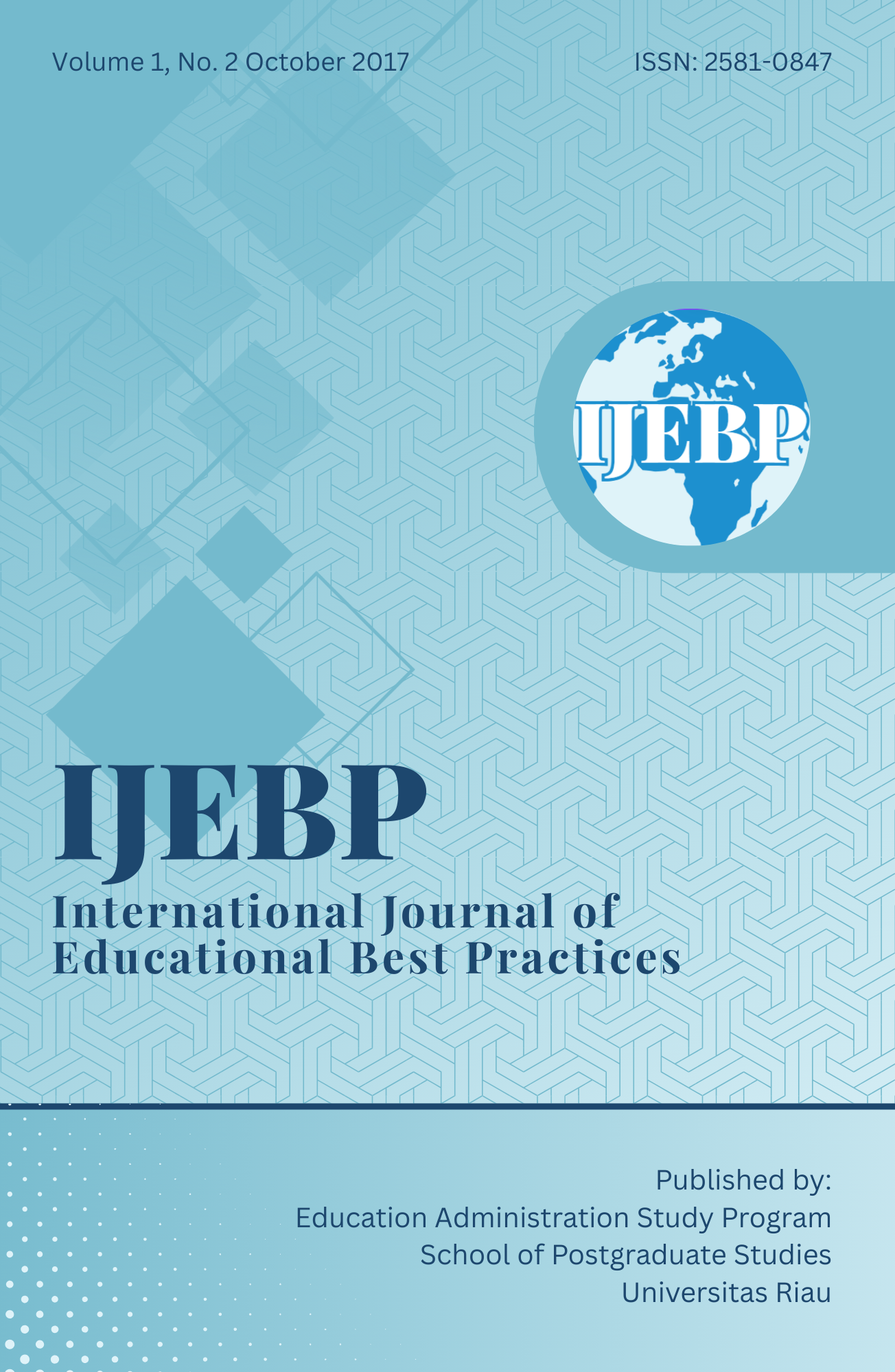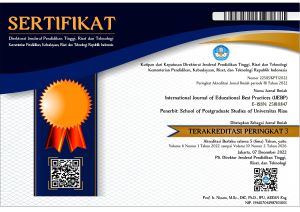Headteachers Conflict Management Styles and Teachers Job Satisfaction in Malaysian Primary Schools
DOI:
https://doi.org/10.31258/ijebp.1.2.38-49Keywords:
conflict management styles, teachers job satisfaction, head teachers, teachersAbstract
The purpose of this study was to investigate the conflict management styles among head teachers and the relationships between the styles and teachers job satisfaction. The study also examined the head teachers conflict management styles and teachers job satisfaction based on the demographic characteristics. A questionnaire was administered to 120 respondents in 5 primary schools in the district of Tampin, Malaysia. Descriptive and Manova statistics were used to examine the levels and differences of conflict management styles used among head teachers and teachers job satisfaction in terms of their demographic characteristics. The findings showed that the head teachers used all the five conflict management styles: cooperating style, adapting style, compromising style, bargaining style, and problem-solving style. Most head teachers preferred cooperating style as compared to bargaining style. Further, the findings showed that there was no difference for all the five conflict management styles in relation to the head teacher demographic characteristics. However, the findings showed that there was a significant difference for teachers job satisfaction in terms of years of service and no difference for teachers job satisfaction in terms of other demographic characteristics. Implications for all policymakers to improve future policy related to leadership training for all head teachers in schools were discussed.
References
Abdul Gafar, Mohamed Najib, Abdul Rahim Hamdan, Azizi Yahya & Siok Beng Tay. (2009). Kepimpinan kerja berpasukan dan kepuasan berkerja. Jurnal Pendidikan Universiti Teknologi Malaysia. 14: 26-46.
Abdul Latif Samian. (2003). Perkembangan Sains Dan Peradaban Manusia, Bangi: Universiti Kebangsaan Malaysia.
Balzer, W. K., Kihm, J. A., Smith, P. C., Irwin, J. L., Bachiochi, P. D., Robie, C., Sinar, E. F., & Parra, L. F.(2000) Users‘ Manual For The Job Descriptive Index And The Job In General Scales. Bowling Green, OH: Bowling University.
Boucher, M. M. (2013). The relationship of principal conflict management style and school climate. Tesis Doktor Falsafah, Fakulti Guru Besaran Pendidikan, Universiti South Carolina.
Darwyan Syah. (2010). Faktor-faktor yang mempengaruhi prestasi guru pendidikan agama Islam pada sekolah dasar negeri Kota Depok Proinisi Jawa Barat. Tesis Doktor Falsafah, Fakulti Pendidikan, Universiti Malaya.
Foo Say Fooi & Tang Keow Ngang. (2005). Faktor- faktor yang mempengaruhi pengurusan
kerjasama. Jurnal Pendidik dan Pendidikan. 20: 81-95.
Hellriegel, D., Slocum, J. W., & Woodman, R. W. 2001. Organizational Behavior. (9th Edition). USA: South-Western College Publishing.
Junaidah Mohamad & Nik Rosila Nik Yaacob. (2013). Kajian tentang kepuasan bekerja dalam kalangan guru-guru pendidikan khas. Jurnal Pendidikan Asia Pasifik. 28: 103-115.
Jainabee L. S. Md Kassim. (2005). Budaya organisasi dan kepuasan kerja di maktab perguruan Malaysia. Tesis Dr Falsafah. Universiti Kebangsaan Malaysia.
Kementerian Pendidikan Malaysia. 2012. Pelan Pembangunan Pendidikan Malaysia 2013-2025.
Krejcie, R. V., & Morgan, D. W. (1970). Determining sample size for research activities. EducPsychol Meas.
Lokman Mohd Tahir & Normah Abd Kadir. (2008). Mohammed Sani, Mohd Izham dan Jainabee Gaya pengurusan konflik guru besar. Jurnal Teknologi. 48(6): 115-127.
Lokman Mohd Tahir, Mohd Anuar Abd Rahman & Normah Abd Kadir. (2008). Gaya pengurusan konflik dalam kalangan Guru besar sekolah rendah daerah Johor Bahru. Kertas Kerja, Fakulti Pendidikan, Universiti Teknologi Malaysia.
Mohammed Sani Ibrahim, Mohd Izham Mohd Hamzah & Jainabee Md Kassim. (2007). Tahap pengurusan konflik dalam kalangan guru besar-guru besar dan guru-guru di sekolah rendah. In: The 5th ASEAN Symposium on Educational Management and Leadership (ASEMAL 5), Legend Hotel, Kuala Lumpur, 18-19 August.
Muhammad Asyraf Mohd Kassim & Hazril Izwar Ibrahim. (2014). Conflict management styles and organizational commitment: a study among bank employees in Penang. International Journal of Business, Economics, and Law. 1(4): 45-53.
Mohd Foad Sadakan. (2005). Pengurusan Konflik. Dewan Bahasa dan Pustaka: Kuala Lumpur. Noraini Idris. (2003). Penyelidikan dalam Pendidikan Edisi Kedua. McGraw-Hill Education: Selangor.
Rahim, M.A. (2002). Toward the theory of managing organizational conflict. Jurnal Antarabangsa Pengurusan Konflik. 3(13): 206-235.
Rahim, M. A. (2001). Managing Conflict in Organizations (Esisi Ketiga). British Library, Greenwood Publishing Group: USA.
Rahim, M. A., & Magner, N. R. (1995). Confirmatory factor analysis of the styles of handling interpersonal conflict: First-order factor model and its invariance across groups. Journal of applied psychology. 80(1): 122-132.
Rahim, M. A. (1992). Managing Conflict in Organizations (Edisi Kedua). Western Kentucky University, Bowling Green: USA. Saiti, A. (2014). Conflicts in schools, conflict management styles and the role of the school leader A study of Greek primary school educators. Educational Management Administration & Leadership, 1-28.





